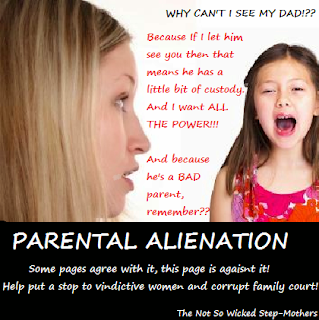Dr. Childress Response to a Parent:
 I receive many requests for help and guidance. When I am contacted, professional standards of practice prevent me from commenting on the specifics of an individual case. However, the relationship dynamics involved with the pathogenic parenting of “parental alienation” processes are exceedingly similar across families, because they originate in the same type of parental psychopathology (a narcissistic personality disorder with borderline features decompensating into persecutory beliefs regarding the targeted/rejected parent’s abuse potential relative to the child).
I receive many requests for help and guidance. When I am contacted, professional standards of practice prevent me from commenting on the specifics of an individual case. However, the relationship dynamics involved with the pathogenic parenting of “parental alienation” processes are exceedingly similar across families, because they originate in the same type of parental psychopathology (a narcissistic personality disorder with borderline features decompensating into persecutory beliefs regarding the targeted/rejected parent’s abuse potential relative to the child).

Recently I received the following question from a parent, and I thought my response to this parent might be helpful to other parents (and to mental health professionals).
“Hello Dr. Childress, What assessment tools do you use to identify the possibility of a likely Parental Alienation Dynamic? Would you need to interview the children? Melissa”
The assessment of "parental alienation" (i.e., pathogenic parenting) involves clinical interviews primarily with the child, but also with the targeted parent and child. Additional interviews with the "alienating" parent can be helpful to confirm the diagnosis but are not necessary to making the diagnosis of "pathogenic parenting" associated with "parental alienation" processes.
Three separate symptom features are evident in the child's symptom display:
1: Suppression of the normal range functioning of the child's attachment system relative to one parent.
 2. The presence of a specific set of narcissistic and borderline personality disorder features in the child's symptom display, involving:
2. The presence of a specific set of narcissistic and borderline personality disorder features in the child's symptom display, involving:
a.) "Splitting," in which the child views one parent as overly idealized and the other parent as overly devalued (see attached Appendix A: Splitting)
b.) A grandiose judgment of a parent in which the child is in an elevated status position in the family hierarchy above that held by the targeted/rejected parent;
c.) A sense of entitlement in which the child feels justified in inflicting a retaliatory retribution on the targeted/rejected parent if the child's entitled expectations are not met to the child's satisfaction;
d.) A haughty and arrogant attitude of contempt regarding the "fundamental human inadequacy" of the targeted/rejected parent;
e.) A complete absence of normal-range empathy and compassion for the feelings of the targeted/rejected parent;
3. An intransigently held, fixed and false belief system regarding the fundamental inadequacy of the targeted/rejected parent and/or the abuse potential (typically "emotional abuse") of the targeted/rejected parent.

If this specific set of 3 symptoms is present in the child's symptom display, the only possible origin of this particular symptom set is through induction. This specific symptom set CANNOT originate authentically to the functioning of the child's nervous system. This symptom set MUST be induced through pathogenic parenting - either from the distorted and aberrant parenting of the targeted/rejected parent, or from the distorted and aberrant parenting of the allied/idealized parent. One way or the other, this symptom set only arises from being induced in the child through aberrant and distorted parenting practices.
The next diagnostic step is to rule-out pathogenic parenting emanating from the targeted/rejected parent. This involves joint parent-child sessions in which the parenting behavior of the targeted/rejected parent, and the child's responses to the parenting behavior of the targeted/rejected parent, are clinically evaluated.
If the parenting behavior of the targeted/rejected parent is broadly normal range[1] (i.e., no evidence of alcoholism, chronic drug use, excessive anger dysregulation, domestic violence, severely distorted communication processes), so that the parenting behavior of the targeted/rejected parent could not reasonably account for the creation of the child's symptom constellation of the three specific features noted above, then the pathogenic parenting MUST be originating in the aberrant and distorted parenting of the other parent.
There is no other alternative explanation for the presence of that specific set of symptoms displayed by the child. That symptom set CANNOT arise endogenously to the authentic functioning of a child's nervous system. That specific set of symptoms MUST be induced through interpersonal processes - i.e., through pathogenic parenting emanating either from the targeted/rejected parent or from the allied/idealized parent. If the targeted/rejected parent is not inducing that specific symptom set, then it MUST be induced by the allied/idealized parent. There is no other alternative explanation regarding the origins of that specific child symptom set.
Diagnosis is made from clinical interviews with the child and targeted/rejected parent. If the allied/idealized parent consents to clinical interviews, then these interviews can confirm the diagnosis, but they are not necessary to make the diagnosis.
Associated Clinical Signs:
Additional confirmatory symptoms are also typically present, and while not necessary for the diagnosis, these additional "associated clinical signs" can support the diagnosis:
1) Listen to the Child: The allied/pathological parent prominently evidences the phrase "...listen to the child..." - such as "I'm only listening to the child" - "you [i.e., therapists, attorneys, etc.] should just listen to the child" - "why isn't anyone listening to the child." This phrase by the allied/pathological parent comes from a need to empower the child, both to exploit the child’s expressed rejection for the other parent and also for a specific need to empower the child, originating from particular psychological dynamics with the allied/pathological parent. An associated effort for empowering the child is the allied/pathological parent advocating that “the child should be allowed to decide” if he or she goes on visitations with the targeted/rejected parent. The core issue is a need to empower the child.
2) Exploiting the Child’s Symptoms: An exploitation of the child's symptoms by the allied/pathological parent to limit, restrict, disrupt, and nullify the ability of the targeted/rejected parent to form a relationship with the child.
3) Protecting the Child: The allied/pathological parent prominently presents in the role as the "protector" of the child from the abuse (typically emotional abuse) of the targeted/rejected parent. The need to "protect the child" can reach almost obsessional levels.
4) Selective Parental Incompetence: The allied/pathological parent presents as selectively incompetent, typically using the phrase "...what can I do, I can't make the child..." - for example; "I encourage the child to go on visitations with the other parent, but what can I do, I can't make the child go if the child doesn't want to go." - "I tell the child to cooperate with the other parent, but what can I do, I can't make the child be nice to the other parent. I'm not there, how am I supposed to make the child be nice to the other parent?" The presence of this phrase has to do with the narcissistic exploitation of the child's symptoms.
5) Justifying – “I know just how the child feels…”: The selective incompetence of the allied/pathological parent is often accompanied by a statement of understanding for the child's hostility and rejection of the other parent - "I tell the child to be cooperative, but what can I do, I can't make the child be cooperative, I'm not there. And, actually, I know just how the child feels. The other parent acted just like that with me during our marriage."
6) Typical Complaints: The typical complaints regarding the targeted/rejected parent are,
A) too insensitive, the targeted/rejected parent doesn't “listen to the child;”
B) too rigid, inflexible and controlling, the targeted/rejected parent always has to have things his (or her) way;
 C) anger management issues, the targeted/rejected parent has anger management problems;
C) anger management issues, the targeted/rejected parent has anger management problems;
D) too selfish and self-centered, combines doesn't listen to the child and always has to have things his or her own way.
7) Disregard of Court Orders: The allied/pathological parent displays a cavalier disregard for the authority of Court orders, so that the targeted/rejected parent must continually return to Court seeking enforcement of Court orders. This represents the expression of narcissistic personality processes of the allied pathological parent. Narcissists to not recognize (i.e., perceptually register) the construct of "authority" - only the power to compel. For the narcissist, the construct of "authority" (such as the Court's authority) is synonymous with the "power to compel." If the Court does not compel, then the Court has no authority in the mind of the narcissist.
Linehan, M. M. (1993). Cognitive-behavioral treatment of borderline personality disorder. New York, NY: Guilford
“They tend to see reality in polarized categories of “either-or,” rather than “all,” and within a very fixed frame of reference. For example, it is not uncommon for such individuals to believe that the smallest fault makes it impossible for the person to be “good” inside. Their rigid cognitive style further limits their abilities to entertain ideas of future change and transition, resulting in feelings of being in an interminable painful situation. Things once defined do not change. Once a person is “flawed,” for instance, that person will remain flawed forever.” (p. 35; emphasis added)
“Splitting: The individual deals with emotional conflict or internal or external stressors by compartmentalizing opposite affect states and failing to integrate the positive and negative qualities of the self or others into cohesive images. Because ambivalent affects cannot be experienced simultaneously, more balanced views and expectations of self or others are excluded from emotional awareness. Self and object images tend to alternate between polar opposites: exclusively loving, powerful, worthy, nurturant, and kind – orexclusively bad, hateful, angry, destructive, rejecting, or worthless.” (p. 813; emphasis added)
 Borderline Personality Disorder Criterion 2:
Borderline Personality Disorder Criterion 2:
“A pattern of unstable and intense interpersonal relationships characterized by alternating between extremes of idealization and devaluation” (p. 710; emphasis added)
Siegel, J.P. (2006). Dyadic splitting in partner relational disorders. Journal of Family Psychology, 20(3), 418–422.
“Splitting is an identified symptom of both borderline and narcissistic personality disorders.” (p. 419)
Watson P. J. and Biderman, M.D. (1993). Narcissistic personality inventory factors, splitting, and self-consciousness. Journal of Personality Assessment, 61 (1), 41-57.
“Splitting is often thought to be central to pathological narcissism” (p. 44)




































































